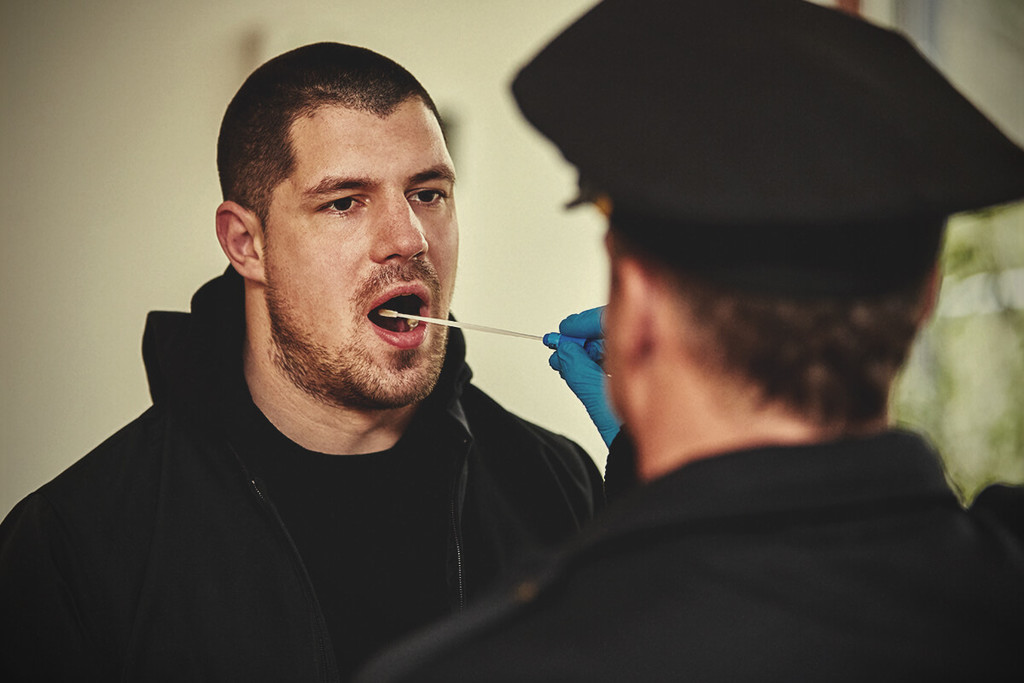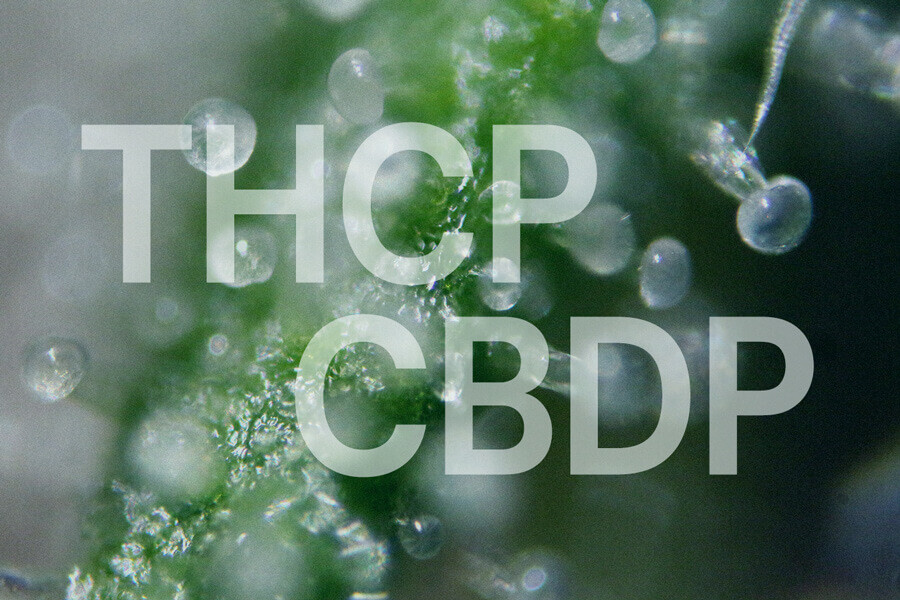.
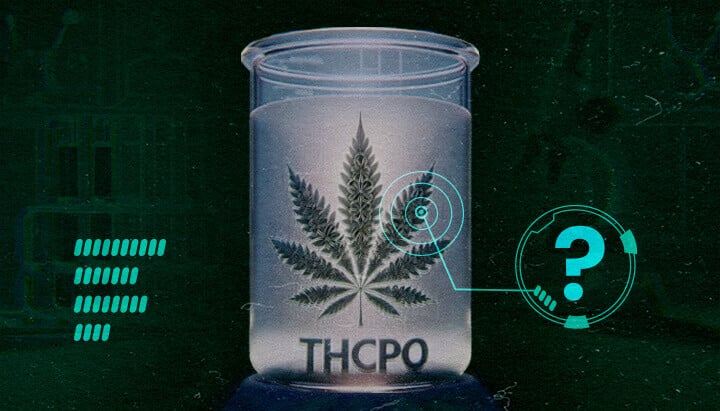
What Is THCPO?
THCPO is a novel synthetic cannabinoid. Besides its potency, which is greater than that of THC, little else is known about this compound, its effects, or safety. We’re here to shine a light on everything we know about THCPO to help you decide whether to try it or not.
Contents:
Did you know that THCPO might be one of the most potent cannabinoids discovered yet? Despite being relatively new to the cannabis market, this compound is already gaining a reputation for its intense psychoactive effects and potential holistic benefits. Some even say it's stronger than THCP, which itself is known for being significantly more powerful than regular THC.
In this article, we share everything we know about THCPO—what it is, how it compares to other cannabinoids, its effects on the body, legal status, side effects, and more.
What Is THCP-O (THCP-O)?
THCPO (tetrahydrocannabiphorol acetate) is a synthetic analogue of THCP (tetrahydrocannabiphorol), which itself is a naturally occurring homologue of THC. What makes THCPO different from THCP is the addition of an acetate group—a chemical structure also found in THC-O. This modification may increase the cannabinoid's bioavailability, potentially making it more potent when inhaled or ingested.
Unlike THC and CBD, which are directly extracted from the cannabis plant, cannabis does not naturally contain THCPO. Instead, it is created in a laboratory using THCP as the base. THCP itself is known to have a high binding affinity for CB1 receptors in the brain—significantly greater than that of delta-9 THC[1]. Acetylating THCP results in THCPO, which may enter the brain even more efficiently and deliver a stronger, longer-lasting effect.
Though exact data on THCPO remains scarce, its increasing availability in products like vape cartridges and edibles is drawing attention from both consumers and researchers. As with other emerging cannabinoids, much of what we currently know about THCPO comes from anecdotal reports, early chemical analyses, and comparisons with related compounds.
How Does THCPO Work in the Body?
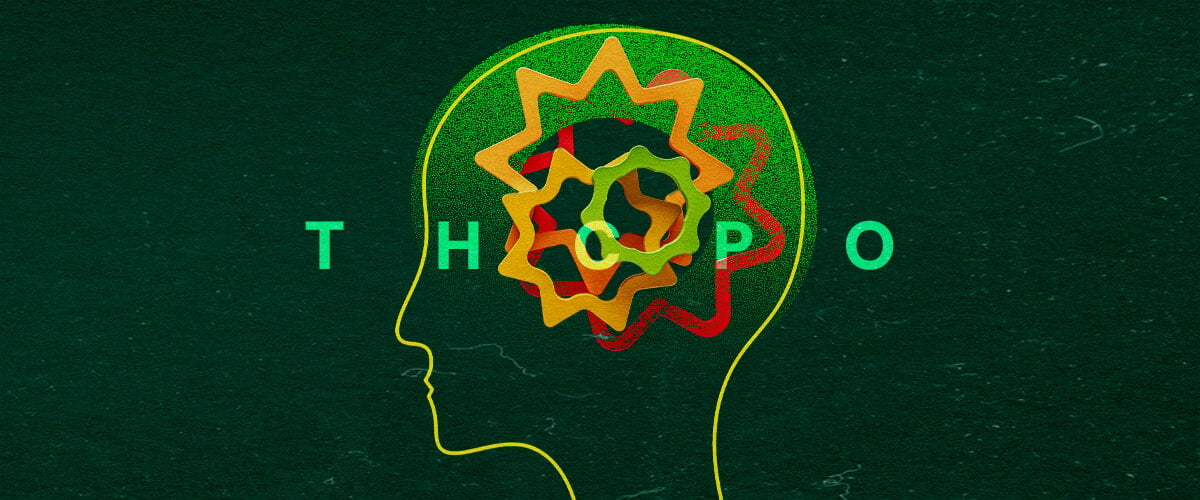
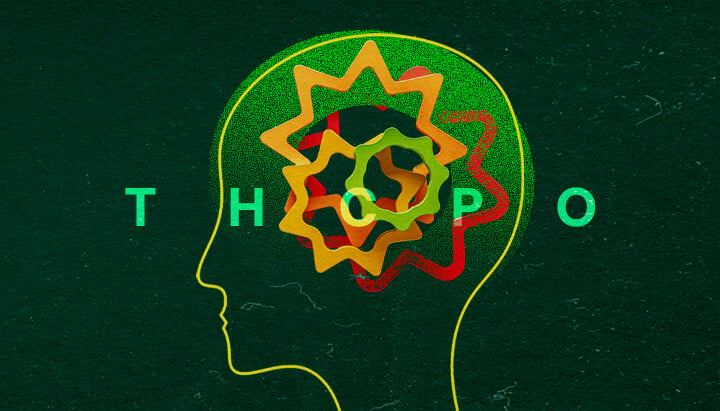
To understand how THCPO affects the body, it helps to first understand the endocannabinoid system (ECS), a network of receptors that help regulate a wide range of physiological functions.
Interaction with the Endocannabinoid System
THCPO interacts mainly with CB1 receptors, which are found in high concentrations in the brain and central nervous system. These receptors influence things like mood, appetite, memory, and perception.
While THC also binds to these receptors, its ability to do so isn’t as high as that of THCP—which explains THCP’s stronger effects. While THCPO hasn't been studied extensively, early assumptions suggest that its affinity may be similar or even greater than that of THCP, due to its acetylated form.
The acetylation of cannabinoids (as seen in both THC-O and THCPO) appears to enhance their ability to cross the blood–brain barrier. This means more of the compound can reach the brain more quickly, potentially explaining why THCPO’s effects are not only stronger but also more intense and longer-lasting.
It’s important to note that THCPO’s effects may not strike immediately. As with THC-O, users often report a delayed onset, particularly when the cannabinoid is ingested rather than inhaled. This can increase the risk of accidental overconsumption for users unfamiliar with its delayed response.
Potential Effects and Benefits
User experiences suggest THCPO produces intense psychoactive effects, including:
- Euphoria and elevated mood
- Altered time perception
- Enhanced sensory perception (especially sound and color)
- Deep physical relaxation
- Sedation and couch-lock
- Increased appetite (the “munchies”)
Some users also report cognitive stimulation and enhanced creativity, although these experiences vary greatly depending on dosage, method of consumption, and tolerance. Note, however, that these effects aren’t backed by robust scientific evidence. Controlled trials are needed to properly gauge and understand THCPO’s effects.
THCPO vs. THCP vs. THC: What’s the Difference?

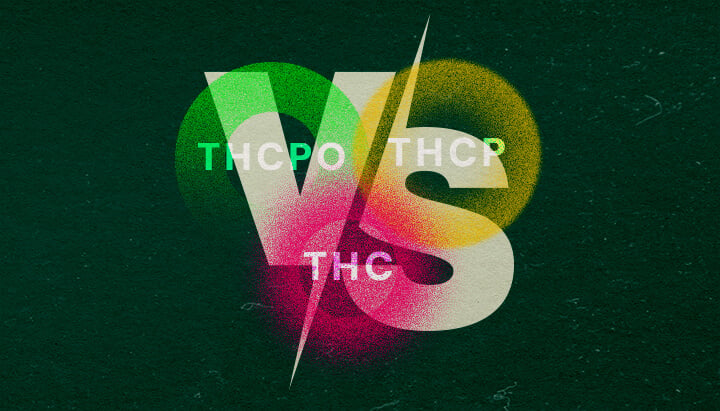
THC, THCP, and THCPO share some similarities. However, differences in potency, legality, and methods of consumption significantly affect how they’re used and experienced.
Potency Comparison
THC is the primary psychoactive compound in cannabis, responsible for the “high” commonly associated with weed. THCP, discovered in 2019, is estimated to be significantly stronger than THC, based on its increased receptor binding affinity.
- THC: Mild to moderate psychoactive effects
- THCP: Up to 33× more active at CB1 receptors than THC
- THCPO: Acetylated version of THCP, likely more potent still
While there are no clinical studies comparing the subjective potency of THC, THCP, and THCPO, early user reports indicate that THCPO can be overwhelming even in small doses. Some experienced cannabis users have described it as having a psychedelic edge, especially when used in high concentrations.
The onset and duration of THC, THCP, and THCPO may also differ:
- THC: Quick onset, especially when inhaled
- THCP: Similar to THC, but with a longer duration
- THCPO: Delayed onset (15–30 mins) with longer and more intense effects
Product Availability
THC products are widely available in countries and states where cannabis is legal. THCP is more difficult to find and often comes at a higher cost due to the complexity of its production. THCPO is even newer and more niche, but a growing number of online stores are beginning to stock it.
Common THCPO product types include:
- Vape cartridges
- Gummies
- Tinctures
- Dabs and concentrates
When buying THCPO, be wary and always check lab reports to verify the authenticity of a product, its cannabinoid content, and to ensure it’s free from contaminants such as residual solvents, pesticides, or heavy metals.
Is THCPO Legal?


THCPO sits in a legal gray area. It’s not specifically listed as illegal in many jurisdictions, but its similarity to THC and its synthetic nature may put it at risk of being illegal or controlled under analogue laws.
Legal Status in the USA
Under the 2018 Farm Bill, cannabinoids derived from hemp (with less than 0.3% delta-9 THC) are legal at the federal level. This is how many companies justify selling THCP and THCPO. However, the DEA has clarified that synthetically modified cannabinoids may be controlled under the Federal Analogue Act, especially if they are intended for human consumption.
Some states—such as Colorado, Oregon, and New York—have already begun restricting synthetic cannabinoids, regardless of their delta-9 content. This includes compounds like THC-O and, most likely, THCPO by extension.
Therefore, while you might be able to buy THCPO online in some US states, its legal status could change quickly as regulations evolve.
Legal Status in Europe and the UK
In the UK, THCPO likely falls under the Psychoactive Substances Act 2016, which bans any substance capable of producing a psychoactive effect (unless specifically exempt otherwise). Since THCPO is not approved for medical use, it is likely illegal to sell or possess it in the UK.
In Europe, the legal landscape varies. Some EU member states might permit sales of hemp-derived cannabinoids, but synthetic modifications often fall under stricter laws. As with the UK, possession or sale could result in legal penalties depending on the national drug laws in place.
Legal Status Comparison
The legality of these cannabinoids varies greatly depending on jurisdiction and how the compounds are derived.
| Compound | Legal Status (USA - Federal) | Legal Status (UK) | Controlled Status in EU |
| THC | Federally illegal, state-dependent | Controlled substance | Controlled in most countries |
| THCP | Gray area under Farm Bill | Likely controlled | Varies by country |
| THCPO | Gray area, potentially restricted | Likely controlled under PSA | Unregulated but high risk |
| THC | |
|---|---|
| Legal Status (USA - Federal) | Federally illegal, state-dependent |
| Legal Status (UK) | Controlled substance |
| Controlled Status in EU | Controlled in most countries |
| THCP | |
|---|---|
| Legal Status (USA - Federal) | Gray area under Farm Bill |
| Legal Status (UK) | Likely controlled |
| Controlled Status in EU | Varies by country |
| THCPO | |
|---|---|
| Legal Status (USA - Federal) | Gray area, potentially restricted |
| Legal Status (UK) | Likely controlled under PSA |
| Controlled Status in EU | Unregulated but high risk |
Potential Risks and Side Effects of THCPO


Due to its potency, THCPO may carry more significant side effects than THC or even THCP. While some may find the experience enjoyable, others might find it overwhelming or even distressing.
Short-Term Effects
Commonly reported short-term side effects of THCPO include:
- Paranoia or panic attacks
- Dizziness and balance issues
- Dry mouth and eyes
- Racing heart rate
- Nausea, especially with high doses
- Disorientation or confusion
Because of its delayed onset, users may take additional doses before feeling the effects, which increases the risk of overdose-like symptoms.
Long-Term Risks of THCPO
There is currently no long-term research available on THCPO. However, based on what is known about other potent synthetic cannabinoids, the following risks are plausible:
- Increased tolerance: Over time, users may need to take higher doses to achieve the same effect.
- Dependence: Heavy users may develop a psychological dependence on THCPO.
- Impact on cognition: Heavy cannabinoid use may affect memory and focus.
- Mental health concerns: Those prone to anxiety or psychosis should avoid high-THC or THCPO products.
Parents and caregivers should also be aware that THCPO may appear in products that are poorly labelled or easily accessible online, increasing the risk of accidental ingestion.
Where to Buy THCPO and How to Choose Quality Products
If you're looking to try THCPO, your best bet is to find a reputable online store. Given the product's niche nature and legal ambiguity, it's important to store carefully.
Reputable Online Stores
Trusted sites selling THCPO will often include:
- Third-party lab reports: Look for full panels detailing a product’s potency and contents of residual solvents, heavy metals, and pesticides.
- Clear contact information: Avoid websites that don’t provide a physical address or phone number.
- Customer reviews: Independent reviews can help verify whether products are effective and reliable.
Always verify a THCPO product’s lab results before purchasing. THCPO is potent, and dosing errors may be dangerous.
Factors to Consider When Buying THCPO
When choosing a THCPO product, ask:
- Is it hemp-derived and compliant with local laws?
- Is the product third-party tested?
- Is the dosage clearly listed?
- Are there real customer reviews of the product, not just testimonials?
- Does the company disclose its extraction or synthesis method?
Avoid any seller that makes medical claims without clinical evidence. These are often red flags for untrustworthy practices.
The Future of THCPO: Trends and Research


THCPO may be relatively new, but it could become more common if legal and market conditions allow.
Emerging Research
Although there are no human clinical studies on THCPO as of 2025, early interest suggests that academic institutions may begin researching its potential in areas such as:
- Neuropathic pain management
- Appetite stimulation
- Anxiety reduction
- Sleep disorders
As cannabinoid research funding increases, THCPO is likely to feature in future investigations.
Market Growth and Predictions
According to cannabis market analysts, niche cannabinoids are projected to grow steadily through 2025–2030. THCPO could see increased demand among:
- Experienced users looking for more intense effects
- Users seeking alternatives to regulated THC products
- Manufacturers exploring novel cannabinoids for new product lines
That said, if regulations tighten—particularly around synthetic cannabinoids—THCPO’s market may remain small or even shrink.
THCPO: There's Still Much to Learn
THCPO is a powerful and intriguing cannabinoid, but much about it remains unknown. While early user experiences and structural comparisons suggest it could be one of the most potent cannabis compounds out there, we’re still missing critical data on its safety, long-term effects, and medical potential.
Until rigorous studies catch up, the best approach to THCPO is caution—especially given that we’re dealing with a substance that appears to amplify the effects of highly potent cannabinoids like THCP.



























